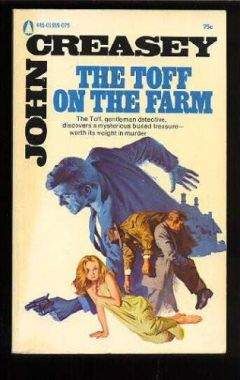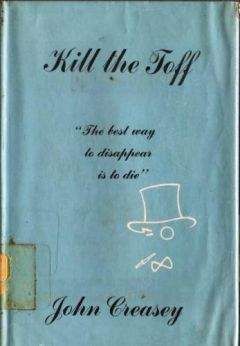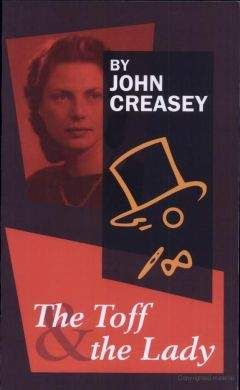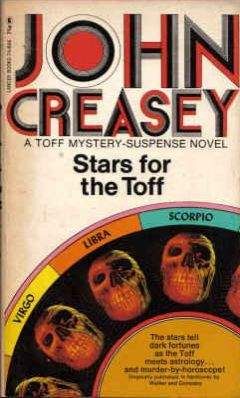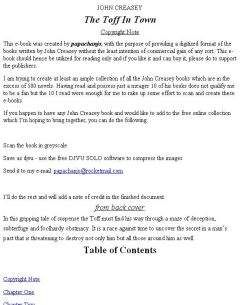John Creasey - The Toff And The Curate
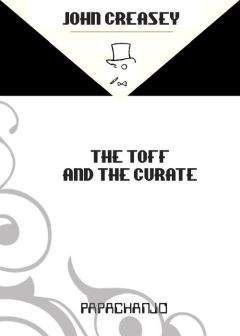
Обзор книги John Creasey - The Toff And The Curate
JOHN CREASEY
The Toff And The Curate
Copyright Note
This e-book was created by papachanjo, with the purpose of providing a digitized format of the books written by John Creasey without the least intention of commercial gain of any sort. This e-book should hence be utilized for reading only and if you like it and can buy it, please do to support the publishers.
This book was scanned by a friend in America along with others.
I am trying to create at least an ample collection of all the John Creasey books which are in the excess of 500 novels. Having read and possess just a meager 10 of his books does not qualify me to be a fan but the 10 I read were enough for me to rake up some effort to scan and create these e-books.
If you happen to have any John Creasey book and would like to add to the free online collection which I’m hoping to bring together, you can do the following:
Scan the book in greyscale
Save as djvu — use the free DJVU SOLO software to compress the images
Send it to my e-mail: [email protected]
I’ll do the rest and will add a note of credit in the finished document.
from back cover
A new Curate had been appointed to the Parish of St Guy’s, but somebody didn’t want him there—and trashed the Parish Hall to get the message across. That might not have interested the Hon Richard Rollison—but murder certainly did and it seemed the two were linked. The denizens of the East End docks, West End nightclubs, black marketeers and a beautiful woman all jostle with The Toff as he weaves his way through London’s highs and lows, his path impeded all the way by the Curate himself. If ever a man were his own worst enemy, it would be the belligerent Rev. Ronald Kemp.
Table of Contents
Copyright Note
Chapter One
Chapter Two
Chapter Three
Chapter Four
Chapter Five
Chapter Six
Chapter Seven
Chapter Eight
Chapter Nine
Chapter Ten
Chapter Eleven
Chapter Twelve
Chapter Thirteen
Chapter Fourteen
Chapter Fifteen
Chapter Sixteen
Chapter Seventeen
Chapter Eighteen
Chapter Nineteen
Chapter Twenty
Chapter Twenty-One
Chapter Twenty-Two
Foreword
RICHARD CREASEY
The Toff—or the Honourable Richard Rollison—was ‘born’ in the twopenny weekly Thriller in 1933 but it was not until 1938 that my father, John Creasey, first published books about him. At once the Toff took on characteristics all his own and became a kind of ‘Saint with his feet on the ground.’ My father consciously used the Toff to show how well the Mayfair man-about-town could get on with the rough diamonds of the East End.
What gives the Toff his ever-fresh, ever-appealing quality is that he likes people and continues to live a life of glamour and romance while constantly showing (by implication alone) that all men are brothers under the skin.
I am delighted that the Toff is available again to enchant a whole new audience. And proud that my parents named me Richard after such an amazing role-model.
Richard Creasey is Chairman of The Television Trust for the Environment and, for the last 20 years, has been an executive producer for both BBC and ITV It was John Creasey who introduced him to the world of travel and adventure. Richard and his brother were driven round the world for 465 days in the back of their parents’ car when they were five and six years old. In 1992 Richard led “The Overland Challenge’ driving from London to New York via the Bering Strait.
CHAPTER ONE
The Curate Makes A Call
Jolly brought the caller’s card into the bathroom where Rollison was brushing his teeth. Nothing in Jolly’s expression gave a clue to his thoughts, although he would have been justified in thinking that 11.15pm was an unreasonable time for a stranger to pay an unexpected visit, even on a summer night.
Rollison glanced down and read:
The Rev Ronald Kemp
Curate
St Guy’s Church, Whitechapel
then looked up into Jolly’s eyes.
“Why?” he asked.
“Mr Kemp would not explain the reason for his call, sir,” said Jolly. “He insisted that he is prepared to wait all night to see you, if needs be.”
The manservant looked as if he were fighting a losing battle with dyspepsia. His appearance often gave rise to the baseless accusation that the Toff—by which soubriquet the Hon Richard Rollison was widely known—had dubbed his man Jolly, inspired by some whimsical fancy to give him a cheerful name to offset his gloomy expression.
“Is that all?” asked Rollison.
“If you are asking me to give you my impressions of Mr Kemp,” said Jolly, cautiously, “I would say that he is in a state of great agitation. He is a large young man, sir.”
“We don’t know him, do we?” asked Rollison.
“I haven’t met him before,” said Jolly, “but when I was in the district a few weeks ago, I understood that a new curate had arrived at St Guy’s. You may recall that the vicar, the Reverend Cartwright, is seriously ill and that the curacy has been vacant for some time.”
“Yes,” said Rollison. “Kemp has certainly taken on a handful.”
“He looks as though he is beginning to realise it,” said Jolly.
Rollison smiled drily but he was interested and sent Jolly to tell the Rev Kemp that he would see him soon.
He wore a silk dressing-gown of duck-egg blue and maroon-coloured pyjamas and slippers; gifts from aunts. The sash about his waist emphasised his tall leanness and the pale blue threw his dark hair and tanned face into relief. He started brushing his teeth again, needing a few minutes to refresh his memory about the parish of St Guy. It was not a parish in which the Church was likely to thrive, although there were several mission houses and the Salvation Army Hostel had a large, if changing, list of clients. It was poor, even in these days when the workers were receiving more money than they had for a long time past, and ‘dock-worker’ was no longer synonymous with occasional work and long periods of enforced idleness. Its inhabitants, hardy, hard-swearing Cockneys with a sprinkling of Indians, Pakistanis, Chinamen, Jamaicans, Irish and various others, had taken the air-raid blows sturdily and aroused the admiration of the rest of the country.
The Vicar of St Guy’s was more than an estimable man; he was godly. His physical courage and endurance had been an inspiration to his neighbours, who could by no stretch of the imagination be called his flock. Yet St Guy’s, being one of the few churches remaining in the district, had a fair membership. Until Cartwright had worked himself to exhaustion, it had been a considerable power for good.
Rollison, being so fond of the East End and its people, greatly regretted Cartwright’s illness. Now, it seemed, a youthful cleric had descended upon the parish and was in trouble; few people came to the Toff unless they wanted help.
He went into the small drawing-room of the Gresham Terrace flat.
The Rev Ronald Kemp jumped to his feet and Rollison saw that Jolly had not exaggerated when he had called him massive. Kemp towered above the Toff, who was over six feet. He was a fair-haired, rugged-looking man, clad in a well-cut suit of pin-striped flannel and wearing a limp-looking clerical collar. Rollison judged him to be no more than twenty-three or four.
“Thanks for seeing me,” said Kemp in a powerful voice. “You’re my last hope, Mr Rollison. Will you help me?”
“I might,” said Rollison, cautiously.
“For the love of Mike, don’t put me off with pretty phrases,” boomed the curate. “If you’re not prepared to help, say so.”
His fine, grey eyes were stormy. He seemed to be fighting to keep a firm hold on himself and his large hands were clenched. He looked at the Toff as if he were sure that his appeal would be turned down.
“It would be a help if I knew what you want me to do,” Rollison said mildly. “I can’t commit myself in advance.”
“I didn’t think it would be any use,” said Kemp, bitterly. “I never did believe in your reputation.”
“Don’t talk like an ass!” said Rollison, sharply enough to startle Kemp into silence. He offered him a cigarette and Kemp took one without shifting his gaze. They lit up and Rollison turned to a corner cupboard.
“Will you have a drink?”
“No, thanks,” said Kemp, and boomed out again: “It’s really serious, Rollison.” Angrily he watched the Toff pouring out whisky and adding soda water.
“Sure you won’t have one?” he asked.
“Well—yes, I will,” said Kemp. He stood with ill-concealed impatience while Rollison rang for Jolly and asked for ice. Rollison sipped the drink appreciatively, while Kemp swallowed half of his in a gulp, then spoke in a more composed voice.
“I’m sorry I let forth like that but I’m worried stiff and I was told you were the only man likely to help me.”
“Exactly what is the trouble?” asked the Toff.
“One of my church members has been charged with murder,” said Kemp, abruptly. “He was arrested a couple of hours ago. I couldn’t make any impression on the police, they practically told me to mind my own business.”
“Either you met a poor policeman,” said Rollison, with a twinkle in his eye, “or else one who didn’t like being told what a fool he was!”
Kemp coloured. “Perhaps I was a bit hot-headed.”
“Who is the accused?” asked Rollison, tactfully.
“A man named Craik,” answered Kemp. “He’s a damned good fellow and I don’t mind admitting that without him I would have been absolutely lost.” He smoothed down his short hair and went on abruptly: “Craik was mixed up in a fight early this evening. One of the men was killed. He’d been stabbed. The police say that the knife was Craik’s.”
“Was it?” inquired Rollison.
“I don’t know but if it was, it was stolen.”
“It might have been,” conceded Rollison. “Do you know what the fight was about?”
“As far as I can gather, there was a lot of foul talk going on, and some of the fellows baited Craik—apparently they didn’t approve of me. I know he shouldn’t have taken it so badly but— well, I don’t believe that he used a knife.”
“So Craik started the fighting,” remarked Rollison.
“I don’t know about that. He answered them pretty stoutly, as far as I can gather, and before anyone knew where he was, the scuffle started. There are dozens of such brawls every night and no one would have thought much about it but for the—er—accident.”
Rollison regarded the young parson thoughtfully.
“I’ll do what I can,” he said, cautiously, “but I must warn you, it’s no use calling murder an accident and no use whitewashing a man because you happen to like him. I don’t say you’re wrong but you’ve got a tough crowd in your parish and you’ll find a streak of violence in unexpected people. Don’t get this thing out of perspective. The English law has a curious habit of doing the right thing in the long run, too.”
Kemp spoke reluctantly.
“I suppose you’re right but—well, what with one thing and another, I feel pretty sore.” Rollison allowed that understatement to pass without comment. “You’re serious?” added the curate, more eagerly. “You will try to help?”
“Yes,” promised Rollison.
“Good man! I—” Kemp looked embarrassed. “I’m afraid I was extremely rude just now.”
“Don’t worry about that,” said Rollison. “Just what do you mean by ‘what with one thing and another’?”
Kemp shrugged his big shoulders.
“Don’t get the idea that I’m complaining,” he said, “I knew that I was going into a pretty hot district. A friend in my previous church suggested it and it rather attracted me. My father is an old friend of Mr Cartwright, too. Since he’s been ill, things have rather run to seed. I’ve been trying to get them going again, but—” he drew a deep breath. “Can you see the sense in it?” he demanded helplessly.
“In what precisely?” asked Rollison, patiently.
“Breaking up meetings, pilfering from our reserve of old clothes—it seems as if there’s someone in the district who wants to wreck everything we try to do.”
“I see,” said Rollison, and added unexpectedly: “The Devil works hard, doesn’t he?”
Kemp looked startled. “I didn’t expect—” he broke off. When he coloured his fair skin was suffused and he looked like a boy.
“You didn’t expect that kind of talk from me,”
Rollison completed for him. “I don’t see why not. Crime is evil, evil springs from somewhere, why not add the “D”? Where are you living?”
“I’ve converted a room at one of the mission halls,” answered Kemp. “Housing’s still a problem near the docks and I thought I’d be wise to try to manage on my own. Will you come with me?” he added, eagerly. “There are one or two people who saw the fight and you might learn something from them.”
“I won’t come with you,” said Rollison, “but I’ll join you in about an hour’s time. Which hall is it?”
“In Jupe Street. Oughtn’t you to have a guide?”
Rollison chuckled. “I can find my way about! You get back, Kemp, and stop thinking that Craik is half-way to the gallows!”
He ushered the young parson out and, when the door closed, turned to see Jolly approaching from his bedroom where, doubtless, he had been listening.
“I’ve laid out your clothes, sir,” said Jolly. “A flannel suit will be all right, won’t it?”
“Yes, thanks. What do you make of him?”
T think he is in a somewhat chastened mood now, sir, and it should be beneficial,” said Jolly. “It is rather an intriguing story, isn’t it?”
“Yes. Do you know Craik?”
“I seem to have heard the name,” said Jolly. “I think he owns a small general store near St. Guy’s.”
“We’ll know soon,” said Rollison. “Try to get Grice on the “phone, will you? If he’s not at the Yard, try his home. Oh—find out first who arrested Craik.”
“Very good, sir,” said Jolly.
Superintendent Grice of Scotland Yard was neither at the Yard nor at his home—he was away for a few days, on a well-earned holiday. Det Sergeant Bray of the Yard had detained Craik and Inspector Chumley—an easy-going, genial individual from the AZ Division—had charged him.
“A curious mixture,” Rollison reflected, “Bray from the Yard doing work in the Division and handing it over to Chumley. Chumley’s usually all right, although he’s a bit of a smiler. I’ll look in and see him after I’ve been to Jupe Street.”
“Will you want me, sir?” inquired Jolly.
“Come, if you feel like it,” said Rollison, “but I don’t expect much tonight.”
